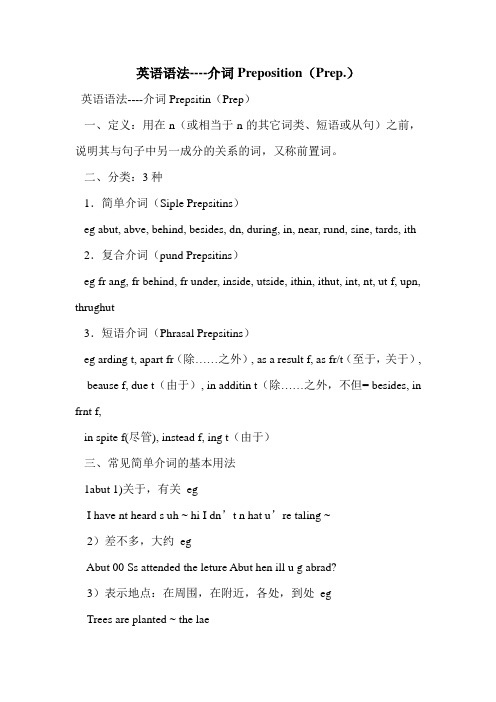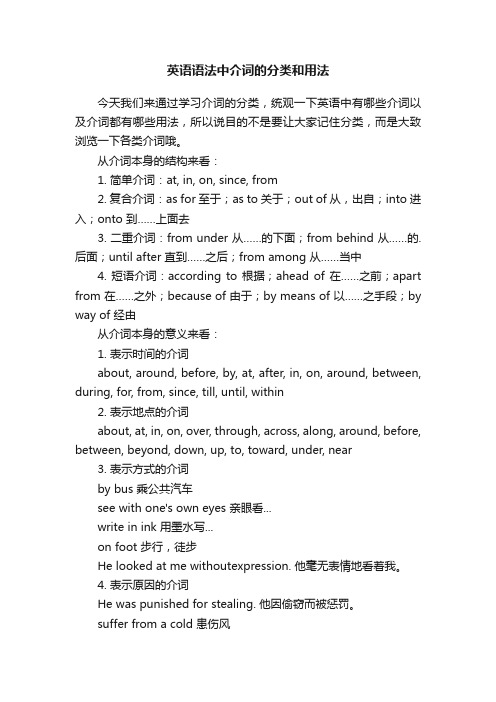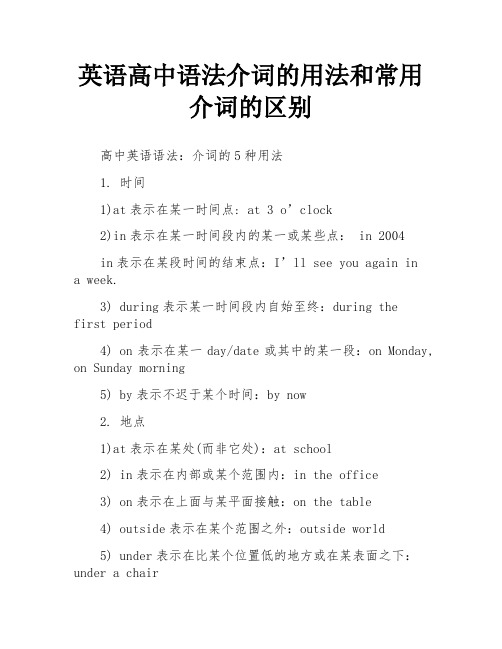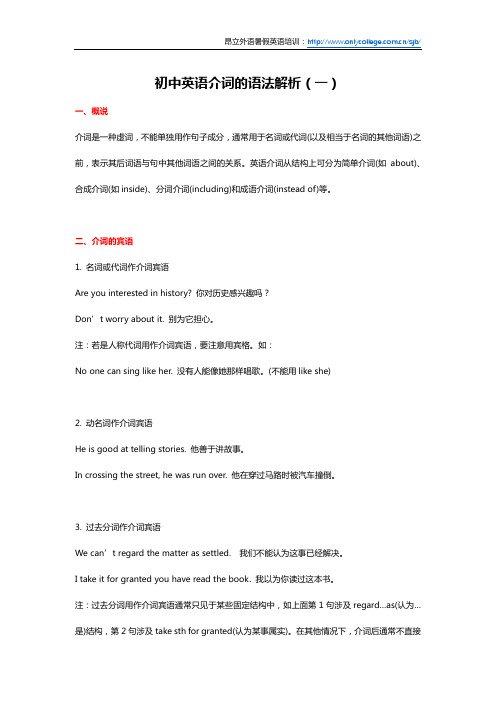介词英语语法.doc
英语语法——介词

on A: I was born ____ Children’s Day. on B: I was born _____the morning of September 1st,1993.
午,晚上用 on
3. in May, in summer, in 2010, in a century… 月 季节 年 世纪等 表示大于一天的时间如___,____,____,______用in ______________________________________
还有: in the morning, in the afternoon , in the evening 泛指 ___________________________________ 在早上/下午/晚上也用 in
4. in front of 和 in the front of
The man is _________ in front of the car. 在……(外部的)前面
The girl is ___________ in the front of the car. 在……(内部的)前面
23. be made
由„制成 以„为根据 找到 在„方面干得好 称赞 考虑
of/from
24. base on
25. come up with
26. do well in 28. think of 29. think about
27. speak highly of 想起
与形容词搭配 1.be different from 和„不同 2.the same as 3.be famous for 和„相同 因„而著名 生„的气 害怕 以„自豪 擅于
英语语法介词归纳总结.docx

英语语法介词归纳总结一、单项选择介词1.The train is ________ schedule. You’ ll have to wait another fifteen minutes. A. in B. behindC. across D. off【答案】 B【解析】考介。
A. in 在⋯⋯里面; B. behind 在⋯⋯后面; C. across穿; D. off 离开。
句意:火晚点了,你必再等十五分。
behind schedule 晚点;落后于定划;期;点。
根据境可知,故 B。
2.(江) Determining where we are ____________ our surroundings remains an essentialskill for our survival.A. in contrast to C. in face of 【答案】 D B.in defense of D. in relation to【解析】【解】考介短辨析。
句意:确定相于我周境的地理位置仍然是我生存的基本技能。
A. in contrast to 与⋯⋯形成照; B. in defense of⋯⋯;C. in face of面⋯⋯;D. in relation to 涉及,相于。
根据境,故 D 。
3.These comments came ______________ specific questions often asked by local newsmen. A. in memory of B.in response toC. in touch with D. in possession of【答案】 B【解析】【分析】考介短辨析。
句意:些是某些常被当地新人到的的回。
A. inmemory of 念, B. in response to 回, C. in touch with 系, D. in possession of 有。
英语语法----介词Preposition(Prep.)

英语语法----介词Preposition(Prep.)英语语法----介词Prepsitin(Prep)一、定义:用在n(或相当于n的其它词类、短语或从句)之前,说明其与句子中另一成分的关系的词,又称前置词。
二、分类:3种1.简单介词(Siple Prepsitins)eg abut, abve, behind, besides, dn, during, in, near, rund, sine, tards, ith 2.复合介词(pund Prepsitins)eg fr ang, fr behind, fr under, inside, utside, ithin, ithut, int, nt, ut f, upn, thrughut3.短语介词(Phrasal Prepsitins)eg arding t, apart fr(除……之外), as a result f, as fr/t(至于,关于), beause f, due t(由于), in additin t(除……之外,不但= besides, in frnt f,in spite f(尽管), instead f, ing t(由于)三、常见简单介词的基本用法1abut 1)关于,有关egI have nt heard s uh ~ hi I dn’t n hat u’re taling ~2)差不多,大约egAbut 00 Ss attended the leture Abut hen ill u g abrad?3)表示地点:在周围,在附近,各处,到处egTrees are planted ~ the laeThe live sehere~ the Peple’s SquareDn’t leave ur bs~ ur des I haven’t an sall hange ~/n e 4)“即将”(近期将)egThe fil is ~ t begin It’s nearl 7:00 The train is ~ t leave2abve 1)在……上方egA bird is fling abve the ds There is a prtrait abve the blabard 2)(在数量上)超过egThe an is nt et frt, but ell ~thirtThe nuber f ne Ss this ear is ~fur hundred3)(能力等)胜过,超越;因太困难、太好而不…… eg The prble is ~ e (这问题太难我不懂。
英语语法中介词的分类和用法

英语语法中介词的分类和用法今天我们来通过学习介词的分类,统观一下英语中有哪些介词以及介词都有哪些用法,所以说目的不是要让大家记住分类,而是大致浏览一下各类介词哦。
从介词本身的结构来看:1. 简单介词:at, in, on, since, from2. 复合介词:as for 至于;as to 关于;out of 从,出自;into 进入;onto 到……上面去3. 二重介词:from under 从……的下面;from behind 从……的.后面;until after 直到……之后;from among 从……当中4. 短语介词:according to 根据;ahead of 在……之前;apart from 在……之外;because of 由于;by means of 以……之手段;by way of 经由从介词本身的意义来看:1. 表示时间的介词about, around, before, by, at, after, in, on, around, between, during, for, from, since, till, until, within2. 表示地点的介词about, at, in, on, over, through, across, along, around, before, between, beyond, down, up, to, toward, under, near3. 表示方式的介词by bus 乘公共汽车see with one's own eyes 亲眼看...write in ink 用墨水写...on foot 步行,徒步He looked at me withoutexpression. 他毫无表情地看着我。
4. 表示原因的介词He was punished for stealing. 他因偷窃而被惩罚。
suffer from a cold 患伤风be ashamed of 因……而感到羞愧shake with cold 因寒冷而发抖5. 表示关于的介词What is the book about? 这本书是关于什么内容的?(about关于一般情况)I heard him talk on Chinese medicine last night. 昨晚我听到他讲中国医学。
英语语法:介词用法

英语语法:介词用法介词的用法一:一、介词to的常见用法1.动词+toa)动词+ toadjust to适应,attend to处理;照料,agree to赞同,amount to加起来达…,belong to属于,come to达到,drink to为…干杯,get to到达,happen to发生在某人身上,hold to紧握,lead to通向,listen to听,occur to想起,object to反对,point to指向,respond to回答,refer to参考;指的是…;涉及,reply to回答,see to负责,stick to坚持,turn to求助,write to给某人写信。
b)动词(+sth.)+to+sb.announce to通知某人, describe to向某人描述, explain to向某人解释, express to对某人表达, mention to提及, nod to向某人点头,report to报告, say to告知, shout to对某人大叫, suggest to对某人提建议,speak to与某人交谈, talk to跟某人谈话, whisper to和某人低声耳语。
c)动词+sth./sb.+ to +sth./sb.add to增加, compare to比作, carry to运送至, devote to致力于,introduce to介绍给, invite to邀请参加, join to连接到, leave to委托给,reduce to下降至, sentence to判处, take to带到。
2. be +形容词/过去分词+ tobe alive to觉察;晓得,be attentive to注意;留心,be awake to知晓,be blind to缺乏眼光,be close to紧挨着,be common to对某人来说很普通,be contrary to违反;反对,be devoted to致力,be deaf to不愿意听,be equal to有…的力量,be exposed to暴露;遭受,be fair to对…公平,be familiar to对某人来说熟悉,be grateful to对某人心存感激,be good to对…有好处,be harmful to对…有危害,be important to对…重要,be kind to友好对待,be known to周知于,be married to嫁给,be moved to转移到,be near to靠近,be necessary to对…有必要,be opposite to在对面,be opposed to反对,be pleasant to合某人之意,be proper to专属,be polite to礼貌待人,be rude to粗暴对待,be relative to与…有关,be strange to不习惯,be similar to类似,be suitable to适合,be true to忠实,be thankful to感激,be useful to对…有用,be used to习惯。
介词across, along, through的区别_用法辨析 英语语法.doc

介词across, along, through的区别_用法辨析
1. across 和through 都可表示横过或穿过,前者主要表示从某物的表面横过,涉及面的概念;而后者则表示从某个空间穿过,涉及体的概念。
如:
He walked across the road carefully. 他小心地走过马路。
He walked through the forest alone. 他独自一人走过森林。
有时across 表示横过也可在体内进行,但此时它仍与through 有差别:前者表示从某个体的一端到另一端,而后者表示穿过两端。
如:He walked across the hall. 他从大厅的一端走到另一端。
He walked through the hall. 他穿过大厅。
2. along 表示沿着,通常用于狭长的东西。
如:
I saw him running along the road. 我看见他沿着这条路跑。
We walked along the river. 我们沿河散步。
3. 注意以下习惯用法:
(1) 与抽象名词连用,表示通过,一般只用through。
如:
He became richer through hard work. 他勤奋致富。
(2) 在美国口语中,可用from ... through 表示从到(此时不用along 或across)。
如:
We work from Monday through Saturday. 我们从星期一到星期六工作。
英语高中语法介词的用法和常用介词的区别

英语高中语法介词的用法和常用介词的区别高中英语语法:介词的5种用法1. 时间1)at表示在某一时间点: at 3 o’clock2)in表示在某一时间段内的某一或某些点: in 2004in表示在某段时间的结束点:I’ll see you again ina week.3) during表示某一时间段内自始至终:during thefirst period4) on表示在某一day/date或其中的某一段:on Monday, on Sunday morning5) by表示不迟于某个时间:by now2. 地点1)at表示在某处(而非它处):at school2) in表示在内部或某个范围内:in the office3) on表示在上面与某平面接触:on the table4) outside表示在某个范围之外:outside world5) under表示在比某个位置低的地方或在某表面之下:under a chair6) by表示靠近或接近:by the window3. 原因1)because of表示因为或以…为理由:because of my father2) for表示动作或活动的目的、目标或意图:for sale3) out of表示起源、来源或原因:out of duty4. 方式1)with表示以…方式:with skill2)in表示以某种方式: in French, in cash, in this way5. 方法1) by表示方法、手段: by the back road, by bus, by working hard2) on表示运送方式:on a train, on foot3) in表示途径或材料:in oils高中英语语法中常用介词的区别1、 at、in、on:如:常用词组有: at noon, at night表示时间的 at, in, on:at 表示片刻的时间,at 8 o’clock,at midnight, at the end of, at that time, at the beginning of, at the age of, at Christmas, at New Year 等。
初中英语介词的语法解析(一)

初中英语介词的语法解析(一)一、概说介词是一种虚词,不能单独用作句子成分,通常用于名词或代词(以及相当于名词的其他词语)之前,表示其后词语与句中其他词语之间的关系。
英语介词从结构上可分为简单介词(如about)、合成介词(如inside)、分词介词(including)和成语介词(instead of)等。
二、介词的宾语1. 名词或代词作介词宾语Are you interested in history? 你对历史感兴趣吗?Don’t worry about it. 别为它担心。
注:若是人称代词用作介词宾语,要注意用宾格。
如:No one can sing like her. 没有人能像她那样唱歌。
(不能用like she)2. 动名词作介词宾语He is good at telling stories. 他善于讲故事。
In crossing the street, he was run over. 他在穿过马路时被汽车撞倒。
3. 过去分词作介词宾语We can’t regard the matter as settled. 我们不能认为这事已经解决。
I take it for granted you have read the book. 我以为你读过这本书。
注:过去分词用作介词宾语通常只见于某些固定结构中,如上面第1句涉及regard…as(认为…是)结构,第2句涉及take sth for granted(认为某事属实)。
在其他情况下,介词后通常不直接跟过去分词作宾语,若语义上需要接过去分词(表被动),可换用“being+过去分词”:He went out without being seen by the others. 他出去了,没有被其他人看见。
4. 从句作介词宾语He was not satisfied with what she said. 他对她说的不满意。
I’m worried about where he is. 我担心他上哪儿去了。
- 1、下载文档前请自行甄别文档内容的完整性,平台不提供额外的编辑、内容补充、找答案等附加服务。
- 2、"仅部分预览"的文档,不可在线预览部分如存在完整性等问题,可反馈申请退款(可完整预览的文档不适用该条件!)。
- 3、如文档侵犯您的权益,请联系客服反馈,我们会尽快为您处理(人工客服工作时间:9:00-18:30)。
介词英语语法
【英语语法】
在小学英语中,介词学习的比重占了课程的很大一部分,掌握好介词也是为以后学英语奠定基础的关键之一。
有些孩子由于英语介词不过关而对英语怯步,如今在小升初临门一脚时,如何不让英语介词绊倒通往中学的大道?以下就来看看,他人是如何学习英语介词的?
首先来看看,at in与on在时间方面的用法:
at表示时间的一点;in表示一个时期;on表示特殊日子。
如:
He goes to school at seven o’clock in the morning. 他早晨七点上学。
Can you finish the work in two days? 你能在两天内完成这个工作吗?
Linda was born on the second of May. 琳达五月二日出生。
1 . at后常接几点几分,天明,中午,日出,日落,开始等。
如:
at five o’clock (五点),at down (黎明),at daybreak (天亮),at sunrise (日出),at noon (中午),at sunset (日落),at midnight (半夜),at the beginning of the month (月初),at that time (那时),at that moment (那会儿),at this time of day (在
一天的这个时候)。
2 . in后常接年,月,日期,上午,下午,晚上,白天,季节,世纪等。
如:
in 2006(2006年),in May,2004 (2004年五月),in the morning (早晨/上午),in the afternoon (下午),in the evening (晚上),in the night (夜晚),in the daytime (白天),in the 21st century (21世纪),in three days (weeks/month)三天(周/个月),in a week (一周),in spring (春季)。
3 . on后常接某日,星期几,某日或某周日的朝夕,节日等。
如:
on Sunday (星期日),on a warm morning in April (四月的一个温暖的上午),on a December night (12月的一个夜晚),on that afternoon (那天下午),on the following night (下一个晚上),on Christmas afternoon (圣诞节下午),on October 1,1949 (1949年10月1日),on New Year’s Day (新年),on New Year’s Eve (除夕),on the morning of the 15th (15日的早上)等。
我们常用的方位介词有:in on to
在范围之内用in,在范围之外,如果两地接壤就用on 不接壤的用to如:
Beijing is in the north of China .
Japan is to the east of China .
Shanxi Province is on the west of Hebei Province .
更多介词如下:
表示时间:at, in, on, by, through
表示附近:near, by, beside, at
表示地点:at, in, on
表示除外:besides, except, except for, but
表示方位:in, to, on
表示上下:above, below, over, under, on, beneath
表示方式:by, through, with
表示原因:for, from, at, through, with, because of, due to, owing to, on account of, thanks to
表示价格比率对比:at, by, for, against
表示属性特性:of, with
还有:since, inside, out of, onto, into, without, instead of, from behind, until from, concerning, considering, following, including, regarding, respecting, saving等
更多介词用法如下:
1. at表示在......处,一般指较小的比较具体的地点。
如:He isn t at school. He is at home. 他不在学校,他在家。
2. in表示在......内部;在......里面的意思。
如:What is in the box? 盒子里有什么?
3. on表示在某物的上面,但两者互相接触。
如:My books are on that table. 我的书在那张桌子上。
4. under表示在某物垂直的正下方,两者之间不接触。
如:My cat is under my chair. 我的猫在我的椅子下。
5. behind表示在某物体的后面。
如:The broom is behind the door. 笤帚在门后。
6. in front of表示在......的前面,正好与behind相反。
如:There are some big trees in front of our classroom. 我们教室前面有几棵大树。
7. near表示在某物体的附近,意为接近、靠近。
如:The ball is near the door. 球在门旁边。
8.介词in, on, under, behind是表示静态位置的介词。
